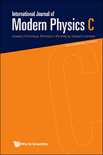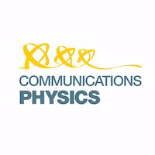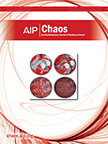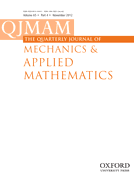
INTERNATIONAL JOURNAL OF MODERN PHYSICS C
Scope & Guideline
Advancing the Frontiers of Computational and Mathematical Physics
Introduction
Aims and Scopes
- Computational Physics:
A core focus of the journal is on computational methods in physics, including numerical simulations and modeling techniques that address complex physical phenomena. - Complex Networks:
The journal frequently publishes research on the structure and dynamics of complex networks, including their mathematical modeling, synchronization, and optimization in various contexts. - Epidemiological Modeling:
There is a significant emphasis on modeling infectious diseases and social dynamics, exploring the spread of epidemics through mathematical frameworks and computational simulations. - Fluid Dynamics and Heat Transfer:
Research on fluid dynamics, particularly in nanofluids and complex flows, is prevalent, with studies often employing advanced numerical techniques to investigate heat transfer and fluid behaviors. - Mathematical Physics:
The journal covers various aspects of mathematical physics, including the application of mathematical models to understand physical systems, phase transitions, and critical phenomena. - Machine Learning and Data Science:
Recent trends indicate a growing integration of machine learning techniques in analyzing complex datasets and optimizing models, highlighting the journal's commitment to advancing computational approaches.
Trending and Emerging
- Artificial Intelligence in Physics:
There is an increasing trend in the application of artificial intelligence and machine learning techniques to solve complex problems in physics, enhancing predictive capabilities and model optimizations. - Interdisciplinary Research:
Research that combines physics with fields such as biology, economics, and social sciences is on the rise, reflecting a broader interest in understanding complex systems across disciplines. - Advanced Numerical Methods:
Emerging themes include the development and application of advanced numerical methods, such as hybrid approaches combining different computational techniques to tackle complex simulations. - Resilience and Robustness of Networks:
The study of the resilience and robustness of networks, particularly in the context of cascading failures and interdependent systems, has gained prominence, highlighting the importance of network stability. - Epidemic Dynamics Analysis:
The journal has seen a surge in research related to epidemic dynamics, especially in light of global health challenges, utilizing mathematical models to understand and control disease spread.
Declining or Waning
- Quantum Computing Applications:
Although quantum computing remains a vibrant field, specific applications within the journal have decreased, possibly due to the rapid evolution of the field and the emergence of more specialized journals. - Traditional Statistical Mechanics:
Research focused solely on classical statistical mechanics has diminished, as interdisciplinary approaches incorporating modern computational techniques gain traction. - Static Theoretical Models:
There appears to be a waning interest in purely theoretical models that do not incorporate computational or empirical validation, as the field moves towards more dynamic and applicable studies. - Conventional Fluid Dynamics Studies:
There is a noticeable reduction in conventional fluid dynamics research without the integration of nanofluids or advanced computational techniques, reflecting a shift towards more complex and interdisciplinary studies. - Simplicity in Model Design:
Research that relies on overly simplistic models without considering complex interactions or real-world applications has become less common, as the journal encourages more nuanced and sophisticated approaches.
Similar Journals

Nonlinear Phenomena in Complex Systems
Fostering Innovation in Mathematical PhysicsNonlinear Phenomena in Complex Systems, published by BELARUSSIAN STATE UNIV, JOINT INST POWER & NUCLEAR RESEARCH, is an emerging platform dedicated to advancing the understanding of nonlinear phenomena within complex systems. With an ISSN of 1561-4085 and an E-ISSN of 1817-2458, this journal serves as a vital resource for researchers spanning the fields of mathematical physics and statistical and nonlinear physics. While classified within the Q4 quartile for both disciplines as of 2023, we encourage authors to submit impactful research that addresses the intricacies and challenges presented by complex systems, which are pivotal in various scientific applications. Targeting an international audience, including researchers, professionals, and students, the journal aspires to foster collaboration and innovation by offering open access to its insightful articles. With a converged publication timeline from 2009 to 2024, Nonlinear Phenomena in Complex Systems is poised to become a significant contributor to the evolving dialogue around nonlinear dynamics and their implications across multiple scientific domains.

Computational and Mathematical Methods
Exploring New Frontiers in Mathematical Modeling and ComputationComputational and Mathematical Methods is a dynamic peer-reviewed journal published by Wiley-Hindawi, focusing on innovative research in the fields of computational mathematics, mechanics, and theory. Since its transition to an Open Access format in 2022, the journal has enhanced its accessibility to researchers and practitioners globally, providing a platform for the dissemination of high-quality studies that contribute to emerging developments in mathematical modeling and computational techniques. Based in the United Kingdom, this journal is committed to fostering collaboration amongst scholars, evidenced by its rankings within Scopus: Q3 in computational mathematics, computational mechanics, and computational theory and mathematics, reflecting its relevance and influence within these critical fields. With an emphasis on interdisciplinary studies, Computational and Mathematical Methods is an essential resource for researchers, professionals, and students seeking to expand their knowledge and apply cutting-edge methodologies to practical challenges.

Communications Physics
Bridging gaps with groundbreaking findings.Communications Physics is a premier open access journal published by Nature Portfolio, dedicated to disseminating high-quality research in the field of Physics and Astronomy. Since its inception in 2018, the journal has rapidly established itself as a vital platform for innovative scientific communication, boasting an impressive Impact Factor and achieving Q1 status in the 2023 category of Physics and Astronomy (miscellaneous). With a Scopus rank of #31 out of 243, placing it within the 87th percentile, Communications Physics attracts a global audience of researchers, professionals, and students eager to engage with cutting-edge findings. The journal supports open access, ensuring that research is freely available to the public, which enhances its visibility and encourages broader discussions within the scientific community. Located in Berlin, Germany, Communications Physics aims to bridge the gap between various disciplines within physics, fostering interdisciplinary collaboration and inspiring future research endeavors.

JOURNAL OF STATISTICAL PHYSICS
Illuminating the pathways of theoretical developments in physics.The Journal of Statistical Physics, published by Springer, is a premier academic journal that has made significant contributions to the fields of Mathematical Physics and Statistical and Nonlinear Physics since its inception in 1969. With a strong reputation reflected in its 2023 rankings—placing it in Q2 of both categories and achieving an impressive Scopus rank of #22 in Mathematical Physics and #25 in Statistical and Nonlinear Physics—this journal serves as a vital platform for researchers, professionals, and students. The impact factor of the journal underscores its importance in disseminating cutting-edge research and theoretical developments. Authors are invited to submit original research articles that explore the intricate complexities of statistical mechanics, quantum physics, and related disciplines, fostering deep insights and academic discourse. Although the journal does not currently offer open access, its robust editorial standards and commitment to advancing knowledge make it an essential resource for those engaged in these dynamic fields.

CHAOS
Decoding Complexity: Where Mathematics Meets PhysicsCHAOS, an esteemed journal published by AIP Publishing, is a cornerstone of interdisciplinary research, focusing on the intricate dynamics of complex systems across various scientific domains. With a balanced impact factor, this journal emphasizes high-quality contributions in Applied Mathematics, Mathematical Physics, and Statistical and Nonlinear Physics, while also exploring intersections with Medicine and Physics and Astronomy. With rankings showing a remarkable percentile placement, notably #7 in Mathematical Physics and #10 in Statistical and Nonlinear Physics, CHAOS has established itself as a leading platform for disseminating groundbreaking research since its inception in 1991. This journal not only aims to foster collaboration among scientists but also to advance theoretical and computational frameworks that unravel the complexities of chaotic systems. Researchers, professionals, and students alike will find rich insights and innovative theories within its pages, making it an invaluable resource in the pursuit of knowledge and understanding in the modern scientific landscape.

THEORETICAL AND MATHEMATICAL PHYSICS
Elevating Research in Mathematical Models and FrameworksTHEORETICAL AND MATHEMATICAL PHYSICS, published by MAIK NAUKA/INTERPERIODICA/SPRINGER, is a premier journal dedicated to advancing the fields of Mathematical Physics and Statistical and Nonlinear Physics. With an impressive history spanning from 1969 to 2024, this journal serves as a vital platform for researchers, professionals, and students eager to explore cutting-edge theoretical frameworks and mathematical models. Although it currently holds a Q3 ranking in both its categories as per the 2023 metrics and is positioned within the Scopus ranks reflecting its growing influence, the journal continually aims to enhance its impact within the academic community. The publication does not currently provide open-access options, underscoring its collector’s nature in the dissemination of valuable research findings. Submissions are welcomed from diverse areas of theoretical physics, providing a rich and collaborative environment for the exploration of complex phenomena and the development of innovative methodologies.

QUARTERLY JOURNAL OF MECHANICS AND APPLIED MATHEMATICS
Exploring Complex Phenomena with Precision and Rigor.Quarterly Journal of Mechanics and Applied Mathematics, published by Oxford University Press, stands as a pivotal platform in the realms of applied mathematics, mechanical engineering, and condensed matter physics. Established in 1948, this venerable journal has continuously contributed to advancements in the understanding of complex mechanical phenomena through rigorous research and scholarly articles. With its Q3 status across multiple categories—applied mathematics, condensed matter physics, mechanical engineering, and mechanics of materials—it serves as a significant resource for both emerging and established researchers. While the journal is not open access, it is highly regarded for its selective publication process, ensuring that only high-quality, original research is disseminated. The impact factor reflects its critical role within the academic community, making it an essential read for scholars, professionals, and students aiming to stay at the forefront of developments in mechanics and applied mathematics.

Proceedings of the Romanian Academy Series A-Mathematics Physics Technical Sciences Information Science
Exploring Innovations in Technical Sciences and InformationProceedings of the Romanian Academy Series A-Mathematics Physics Technical Sciences Information Science, published by EDITURA ACAD ROMANE, is a noteworthy academic journal that serves as a platform for disseminating original research in the intersecting fields of mathematics, physics, engineering, and computer science. With an ISSN of 1454-9069, this journal not only highlights the vibrant academic contributions from Romania but also attracts international submissions, thus fostering global collaboration. Though it currently does not offer an open-access model, the journal remains indexed in significant databases, reflecting its commitment to quality and scholarly rigor. The journal’s impact can be seen through its rankings, including Q4 in Computer Science, Q3 in Engineering, and Q4 across Mathematics and Physics, as well as its Scopus percentile rankings, which indicate meaningful contributions to these domains. With a converged publication span from 2008 to 2024, it aims to catalyze advancements in technical sciences while enriching the academic discourse among researchers, professionals, and students alike. The journal’s headquarters in Bucharest, Romania, positions it as a key player in the Eastern European academic landscape, making it essential reading for those engaged in cutting-edge research.

REVIEWS IN MATHEMATICAL PHYSICS
Fostering Insightful Analyses in Mathematical PhysicsREVIEWS IN MATHEMATICAL PHYSICS is a premier scholarly journal published by WORLD SCIENTIFIC PUBL CO PTE LTD, focusing on the versatile and dynamic field of mathematical physics. Established in 1996, this journal has quickly become a pivotal resource for researchers and professionals seeking in-depth analyses and reviews of contemporary advancements in both mathematical and statistical physics. With an impressive categorization in Q2 for both Mathematical Physics and Statistical and Nonlinear Physics as of 2023, it ranks among the top in its field, boasting a Scopus Rank of #27 in Mathematical Physics and #29 in Statistical and Nonlinear Physics. While currently not available as an open-access platform, the journal remains valuable for its rigorous peer-reviewed articles that aim to bridge the gap between theoretical aspects and practical applications in physics. Given its significant influence—evidenced by a robust footprint in the academic community—REVIEWS IN MATHEMATICAL PHYSICS is essential reading for anyone dedicated to advancing their knowledge and understanding of complex physical phenomena.

ZEITSCHRIFT FUR ANGEWANDTE MATHEMATIK UND PHYSIK
Advancing the Frontiers of Applied Mathematics and PhysicsZEITSCHRIFT FUR ANGEWANDTE MATHEMATIK UND PHYSIK, published by Springer International Publishing AG, is a leading journal in the fields of applied mathematics and physics, highly regarded as evidenced by its prestigious Q1 rankings in 2023 across multiple categories, including Applied Mathematics, Mathematics (miscellaneous), and Physics and Astronomy (miscellaneous). With an ISSN of 0044-2275 and an E-ISSN of 1420-9039, this journal covers a broad spectrum of research from theoretical frameworks to practical applications, making it an indispensable resource for researchers, professionals, and students alike. With converged years running from 1950 to 2024, it offers a rich history of contributions to the scientific community and remains vital for current advancements in mathematics and physics. While not an open-access journal, its subscription model ensures high-quality, peer-reviewed content that fosters innovation and collaboration across disciplines. The journal is conveniently located in Cham, Switzerland, providing a central hub for global research dissemination in these critical areas of study.